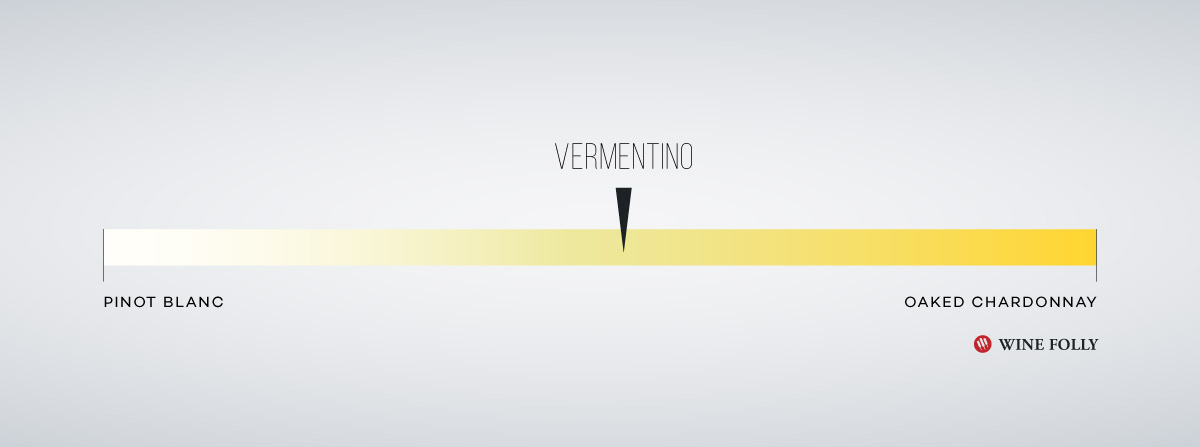Vermentino (“vur-men-teeno”) is a light-bodied white wine that grows mostly in Italy on the island of Sardinia. What’s exciting about Vermentino is it can be deliciously complex in taste in similar style to Sauvignon Blanc. Because Vermentino is so unknown, you can find high quality wines for a great value. Let’s delve into the details of Vermentino wine and what to look for and from where.
Guide to Vermentino Wine
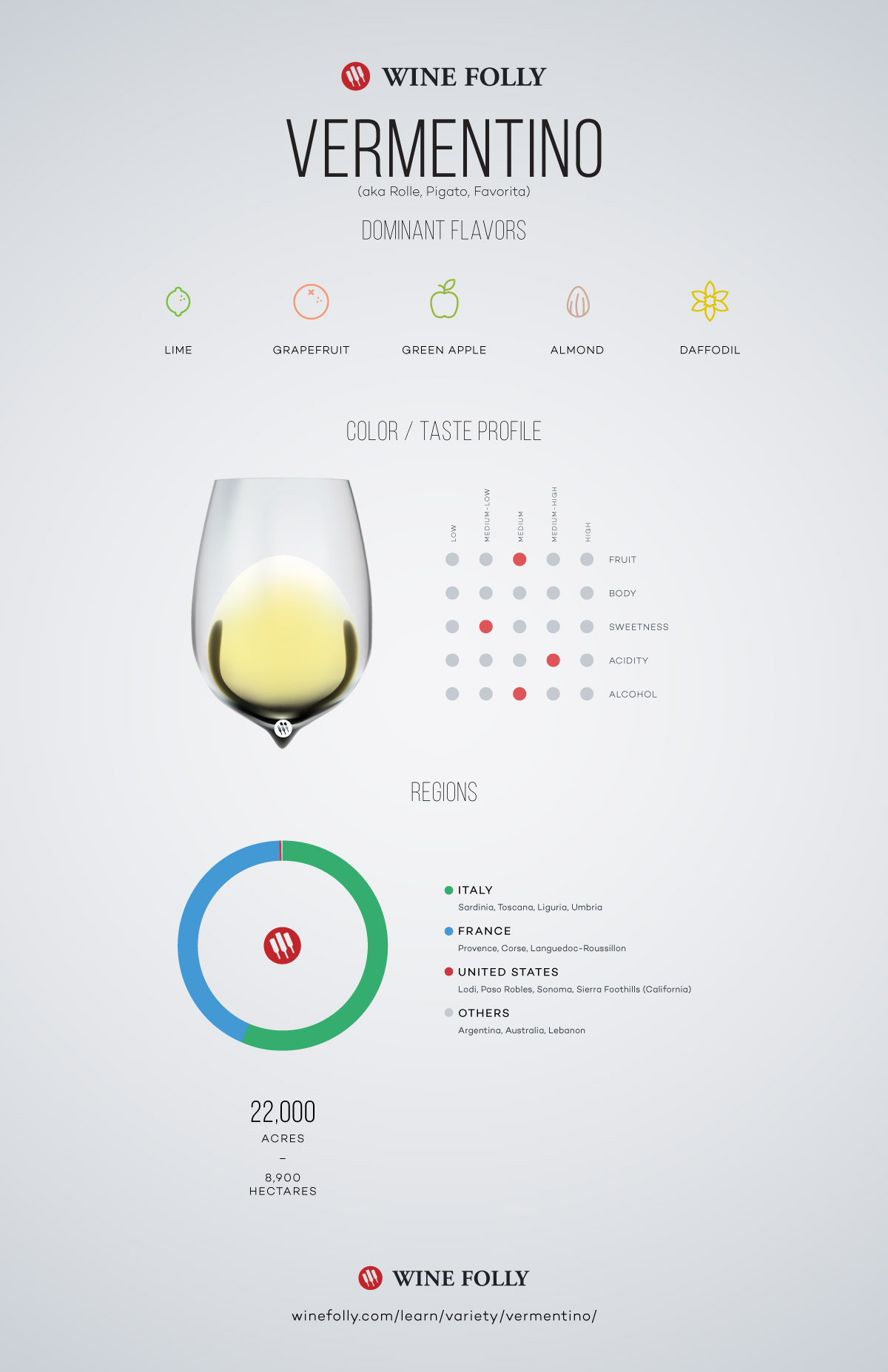
See more detail on Vermentino on page 68 in Wine Folly: The Essential Guide to Wine
If you love Sauvignon Blanc then Vermentino is your friend.
Despite the typical light-bodied character of Vermentino, it’s actually quite complex to taste. This is because Vermentino has higher levels of phenols which contribute to its subtle bitterness on the finish–a taste often described as green almond. A glass of classic Sardinia Vermentino will offer up lively aromas of pear, white peach, lime and pink grapefruit with subtle notes of crushed rocks and citrus zest. On the palate, Vermentino is almost always dry and somewhat oily with flavors of grapefruit and citrus, with a crushed rocky minerality and saltiness. On the finish, it can be a bit snappy with bitterness similar to the taste of grapefruit pith or, if it’s on the riper side, fresh almond.
Similar Wines
Wines with similar body and taste profile include Albariño, Grüner Veltliner, Sauvignon Blanc, Sémillon, Soave and Verdejo.
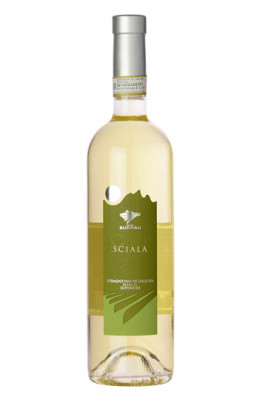
Two styles of Vermentino
When you get into the nitty gritty details of Vermentino, you’ll notice two different styles based on winemaking. One style is richer and creamier and the other is lighter, more floral and zestier.
The difference between the two styles occurs after the alcoholic fermentation as the wine sits in the tank. At this point, the winemaker may choose to add a special kind of bacteria called Oenococcus oeni which feasts on the tart malic acid in the Vermentino (it’s the same acid found in green apples) and produces small amounts of special flavor compound called Diacetyl. The process is called Malolactic Fermentation. Diacetyl tastes creamy and rich like butter and offers a richer oily sensation on the tongue.
Food Pairing with Vermentino
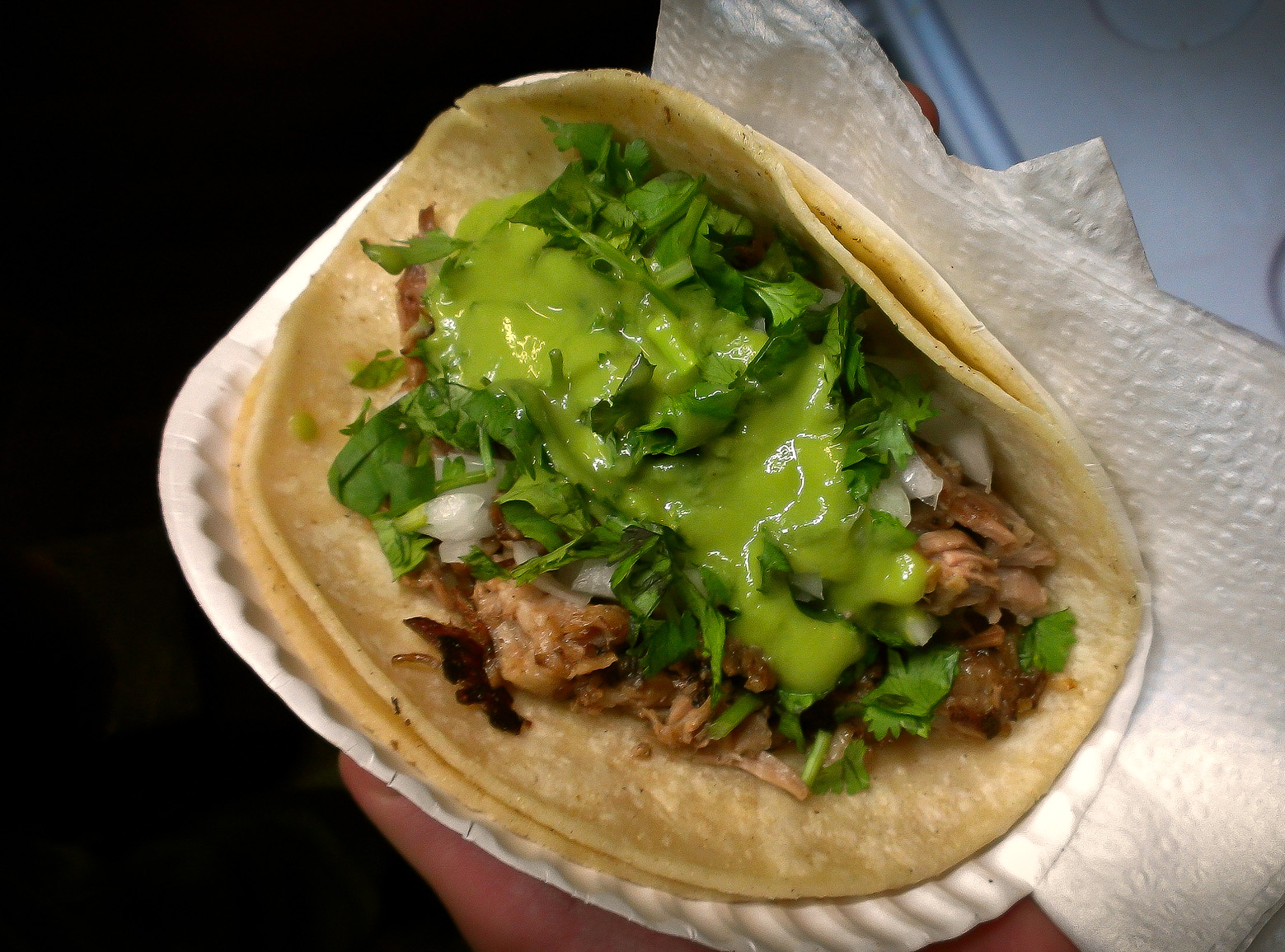
Not technically the regional cuisine but soft chicken tacos with Vermentino are fantastic! by Chris Goldberg
Vermentino with its somewhat oily character, salinity and phenolic bitterness is a wonderful wine to match with medium-weight dishes that play with rich herbs and spices. Due to its bolder intensity, you can easily match this wine with richer fish such as halibut or even meats as bold as fennel-spiced pork sausages. One key thing to pay attention to when pairing with Vermentino is the acidity level in a dish. Vermentino often doesn’t have enough spritzy acidity needed to match against tart pickled dishes (although it will easy match with chicken tacos with a squeeze of lime). Vermentino also is a great wine to pair with garlicky dishes like Pesto.
Examples
- Meat
- Chicken tacos, Fish Tacos, Halibut, planked Salmon, Crab Cakes, Grilled Octopus, Langoustines with garlic and herbs, Roasted Trout with Garlic and Rosemary, Fried Mussels, Fennel-spiced Pork Sausages, Proscuitto-wrapped melons, Clams and freshly made spaghetti, Roasted Quail over mashed parsnip
- Cheese
- Ricotta, Buffalo Mozzarella, Goat Cheese, Pecorino, Feta
- Herb/Spice
- Herbs de Provence, Oregano, Garlic, Thyme, Tarragon, Shallot, Ginger, Cilantro, Marjoram, Parsley, Sage, Rosemary, Basil, Lemon Zest
- Vegetable
- Spinach and Artichoke Calzone, Spinach and Ricotta Ravioli, Green beans, Arugula Salad, Spinach Quiche, Mashed Parsnips, Roasted Zucchini with garlic and herbs, Creamy Leek soup, Pea Shoots, Roasted Asparagus, Sunchokes, Fresh cut corn, Tabbouleh Salad, Falafel, Hummus, White Beans, Yellow Rice, Cauliflower Steaks, Pine nuts, Cashew, Almond, Tangerine
Useful Facts about Vermentino
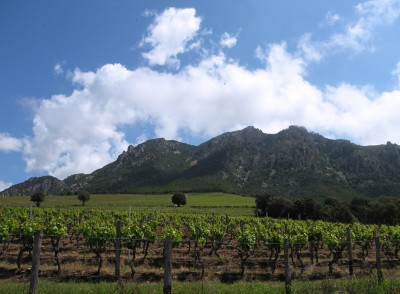
- Nearly half of all Vermentino wine is made in Sardinia.
- Vermentino is a vigorous warm climate variety and tends to produce finer wines on less fertile soils at higher elevations.
- In Provence, Vermentino is called Rolle (“roll”). It’s the secret ingredient to the region’s top-rated Rosé.
- The highest quality Vermentino wines in Sardinia come from the northeastern part called Vermentino di Gallura DOCG. Vermentino di Gallura is required to be a minimum of 95% Vermentino and the “Superiore” quality wines have more rigorous minimum quality restrictions.
- Corsica produces several amazing Vermentino wines (called Vermentinu), which offer high acidity with lean minerality and subtle smokiness.
